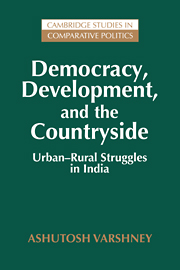Crossref Citations
This Book has been
cited by the following publications. This list is generated based on data provided by Crossref.
Varshney, Ashutosh
1993.
Introduction: Urban Bias in perspective.
Journal of Development Studies,
Vol. 29,
Issue. 4,
p.
3.
Varshney, Ashutosh
1993.
Self‐limited empowerment: Democracy, economic development and rural India.
Journal of Development Studies,
Vol. 29,
Issue. 4,
p.
177.
Jeffrey, C
1997.
Richer Farmers and Agrarian Change in Meerut District, Uttar Pradesh, India.
Environment and Planning A: Economy and Space,
Vol. 29,
Issue. 12,
p.
2113.
1998.
Postcolonial Developments.
p.
33.
1998.
Postcolonial Developments.
p.
291.
1998.
Postcolonial Developments.
p.
379.
Kotwal, Ashok
and
Ramswami, Bharat
1998.
Economic reforms of agriculture and rural growth.
The Journal of Policy Reform,
Vol. 2,
Issue. 4,
p.
369.
1998.
Postcolonial Developments.
p.
106.
1998.
Postcolonial Developments.
p.
234.
1998.
Postcolonial Developments.
p.
1.
Das, R.J
1998.
The social and spatial character of the Indian State.
Political Geography,
Vol. 17,
Issue. 7,
p.
787.
1998.
Postcolonial Developments.
p.
341.
Varshney, Ashutosh
1998.
Mass politics or elite politics? india's economic reforms in comparative perspective.
The Journal of Policy Reform,
Vol. 2,
Issue. 4,
p.
301.
Harriss, John
1998.
Development studies and the development of India: An awkward case?.
Oxford Development Studies,
Vol. 26,
Issue. 3,
p.
287.
1998.
Postcolonial Developments.
p.
154.
1998.
Postcolonial Developments.
p.
330.
Corbridge, Stuart
1999.
‘The militarization of all Hindudom’? The Bharatiya Janata Party, The bomb, and the political spaces of Hindu nationalism.
Economy and Society,
Vol. 28,
Issue. 2,
p.
222.
Das, R J
1999.
The Spatiality of Class and State Power: The Case of India's Land Reforms.
Environment and Planning A: Economy and Space,
Vol. 31,
Issue. 12,
p.
2103.
Brass, Tom
2000.
Labour in post‐colonial India: A response to Jan Breman.
Journal of Peasant Studies,
Vol. 28,
Issue. 1,
p.
126.
Varshney, Ashutosh
2000.
Why Have Poor Democracies Not Eliminated Poverty? A Suggestion.
Asian Survey,
Vol. 40,
Issue. 5,
p.
718.





